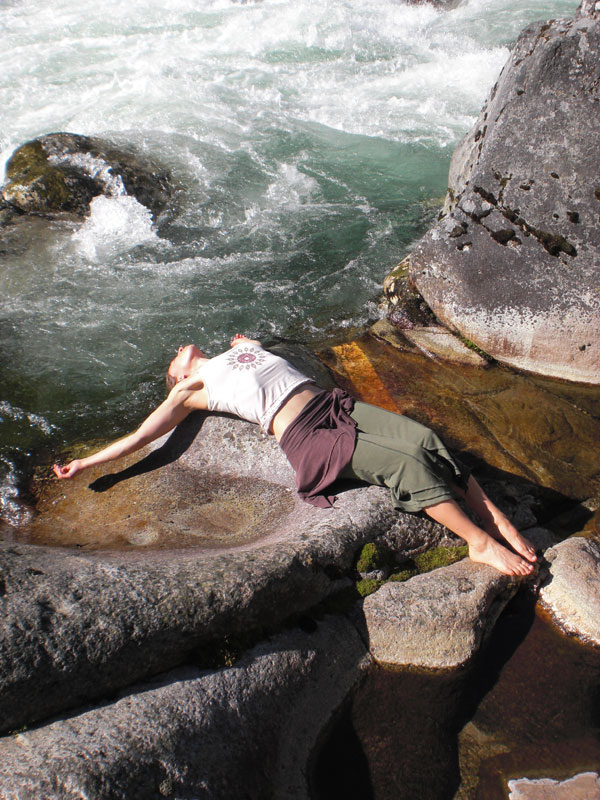Show Up. Let Go.
Most of my books are in storage. They have been for an embarrassingly long time, considering I’m a writer. I blame endless renovations. But even though my copy of the Bhagavad Gita is in a bin somewhere, its wisdom continues to guide me, particularly on one vital point.
And that’s this: the fruits of our actions are not under our control.
The most powerful teaching of the Gita, for me, is to do your best, then let go of the results. Because when we’re not fighting with something that’s out of our control, we can find inner peace.
I’m all for inner peace, but good Lord, is this a hard one! As someone who overthinks things on a regular basis, I’m not always great at letting go. It’s something I think all of us struggle with learning, let alone perfecting.
But yoga isn’t something you perfect, it’s a practice. And since yoga is the way you live your life, that makes life a practice as well.
It seems like everyone is all-too-busy, and most of us are stressed out for myriad reasons, trying to find the balance between action and surrender.
My soul-sister, Tara Findlay, summed it up well when she said, “As a busy Mother, it is my ongoing quest to find balance in the chaos of everyday life. Sometimes I find it with grace, sometimes I have to hit the floor to remember what it is I’m reaching for, and why.”
We don’t always remember to let go. And we don’t always show up fully, either.
How often do you go through the motions without focusing on what you’re doing? Happens every day for me. But I want to show up fully, especially for my family. So I practice this remembrance, again and again. Show up. Let go. Show up. Let go.
Do the best you can, be present, and at the same time, surrender.
So. Hard.
But it’s a practice. I still fall out of poses I’ve done thousands of times. When it happens, I know what to do:
Reconnect. Focus. Execute each pose (or task) with as much skill as possible. And breathe.
Isn’t it interesting, that every single breath is a release? We’re letting go all the time. Every inhale is an opportunity to show up. Every exhale is a reminder to let go.
This lovely piece was sent to me by a kind friend, Krystal Williams, taken from the book The Tao of Motherhood, by Vimala McClure.
Truth is in paradox:
Surrender and you get everything. Bend and be strong.
When you reach your limit and are exhausted, new energy rises in you.
When you release others, they come to you.
The wise know this: Let go in order to preserve.Be empty and fulfilled.
In the Bhagavad Gita, Krishna tells Arjuna to fulfill his dharma—to do the tasks that must be done, those that are before him right now—and then to let go of the fruits of those actions. Take action, but don’t try to control how it turns out. Surrender the fruits of thy actions to the Universe, allowing things to unfold as they will. In other words, trust.
Show up. Let go. Trust. Repeat.

Life is a practice. Sometimes we live with grace, and sometimes we end up on the floor. Whatever happens, keep showing up and letting go, and know that—like Krishna guided Arjuna—you are held by love. For me, trust is coupled with faith. So whatever you believe, when it gets hard to let go, turn to your own truth. Show up for yourself, and let go of anything that doesn’t serve you. Give it to Grace.
“Show up. Let go.” One of my first teachers, Shane Perkins, said these words often in our training, and the mantra works well for me.
How does it feel for you?
Show up. Let go.
Show up. Let go.
Show up. Let go.
Blessed be.
P.S. This will be the theme of my next Sunshine Sunday on Nov. 26th (click for details). I’d love to see you there!


 The last chapter of the Bhagavad Gita is my favorite. Though the entire book is so full of wisdom that you could unpack it and contemplate it for lifetimes, I am drawn most to its last teachings.
The last chapter of the Bhagavad Gita is my favorite. Though the entire book is so full of wisdom that you could unpack it and contemplate it for lifetimes, I am drawn most to its last teachings. And be who you are. Live your personal path, for your unique self contributes to the whole of life.
And be who you are. Live your personal path, for your unique self contributes to the whole of life.